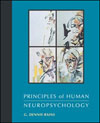G. Dennis Rains,
Kutztown University of Pennsylvania
| bystander apathy | A construct generated from the finding that the probability that a person will come to another's assistance is inversely related to the number of other people present.
|
 |
 |
 |
| cross-theoretic identification | The process whereby specific elements of a theory at a more molar (higher) level of analysis come to be satisfactorily explained by specific elements of a more basic (reducing) theory.
|
 |
 |
 |
| dualism | The idea that there are two spheres or domains of reality (material and spiritual).
|
 |
 |
 |
| emergent property | A property apparent at a higher level of explanation (analysis) that is not reducible to a property at a second, more basic, level of explanation. From this perspective, the hardness of a rock is an emergent property of the molecules that compose it.
|
 |
 |
 |
| explanatory unification | The unified view that results when intertheoretic reduction is possible and a wide range of phenomena can be understood in terms of a single theory (in terms of a single level of analysis).
|
 |
 |
 |
| folk psychology | The everyday psychological conceptual framework in terms of which we all tend to explain behavior and experience as the outcome of beliefs, desires, perceptions, expectations, goals, and other mental constructs.
|
 |
 |
 |
| functionalism | The idea that mental states are functional states of the brain that stand in the same relation to neural mechanisms as functional states of a computer (its program) stand to the computer's hardware.
|
 |
 |
 |
| idealism | The type of monism that holds that only the spiritual (nonphysical) is real.
|
 |
 |
 |
| intentionality | In philosophy, intended meaning or reference; the characteristic of our mental state that describes its directedness at or reference to objects or states in the world other than itself.
|
 |
 |
 |
| intertheoretic reduction | The reduction of a theory that characterizes one level of phenomenon to another theory that characterizes a second, more basic, level of phenomenon.
|
 |
 |
 |
| materialism | The type of monism that holds that only the physical is real.
|
 |
 |
 |
| mental causation | The hypothetical process by which mental processes affect physical objects and events.
|
 |
 |
 |
| monism | The belief that the solution to the mind-body problem is that only one domain (it may be physical or spiritual) is real.
|
 |
 |
 |
| substance dualism | The most emphatic form of dualism, which holds that there is a distinctly mental domain that is not reducible to anything physical.
|
 |
 |
 |
| theoretic interanimation | The process by which, during coevolution, theories at one level of explanation may extend and correct theories at another level. Theories at different levels of explanation thus do not coevolve in isolation.
|



 2002 McGraw-Hill Higher Education
2002 McGraw-Hill Higher Education

 2002 McGraw-Hill Higher Education
2002 McGraw-Hill Higher Education